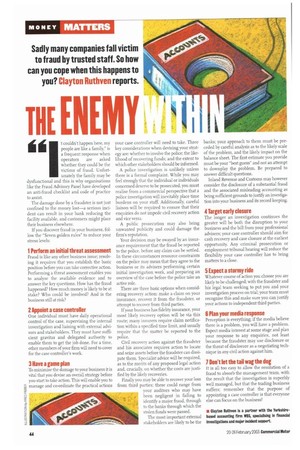THE ENE Sadly many companies fall victim to fraud by
Page 44

If you've noticed an error in this article please click here to report it so we can fix it.
trusted staff. So how can you cope when this happens to you? Clayton Ruthven reports.
t couldn't happen here, my people are like a family," is a frequent response when operators are asked whether they could be the victims of fraud. Unfortunately the family may be dysfunctional and this is why organisations like the Fraud Advisory Panel have developed an anti-fraud checklist and code of practice to assist.
The damage done by a fraudster is not just confined to the money lost—a serious incident can result in your bank reducing the facility available, and customers might place their business elsewhere.
If you discover fraud in your business, follow the "Seven golden rules" to reduce your stress levels:
1 Perform an initial threat assessment
Fraud is like any other business issue; resolving it requires that you establish the basic position before you can take corrective action. Performing a threat assessment enables you to analyse the available evidence and to answer the key questions. How has the fraud happened? How much money is likely to be at stake? Who could be involved? And is the business still at risk?
2 Appoint a case controller
One individual must have daily operational control of the case, supervising the internal investigation and liaising with external advisors and stakeholders. They must have sufficient gravitas and delegated authority to enable them to get the job done. For a time, other members of your firm will need to cover for the case controller's work.
3 Have a game plan
To minimise the damage to your business it is vital that you devise an overall strategy before you start to take action. This will enable you to manage and co-ordinate the practical actions
your case controller will need to take. Three key considerations when devising your strategy are: whether to involve the police; the likelihood of recovering funds; and the extent to which other stakeholders should be informed.
A police investigation is unlikely unless there is a formal complaint. While you may feel strongly that the individual or individuals concerned deserve to be prosecuted, you must realise from a commercial perspective that a police investigation will inevitably place time burdens on your staff. Additionally, careful liaison will be required to ensure that their enquiries do not impede civil recovery action and vice versa.
A public prosecution may also bring unwanted publicity and could damage the firm's reputation.
Your decision may be swayed by an insurance requirement that the fraud be reported to the police, before any claim can be settled. In these circumstances resource constraints on the police may mean that they agree to the business or its advisers performing certain initial investigation work, and preparing an overview of the case before the police take an active role.
There are three basic options when considering recovery action: make a claim on your insurance, recover it from the fraudster, or attempt to recover from third parties.
If your business has fidelity insurance, your most likely recovery option will be via this route; many insurers require claim notification within a specified time limit, and usually require that the matter be reported to the police.
Civil recovery action against the fraudster and his associates requires action to locate and seize assets before the fraudster can dissipate them. Specialist advice will be required, as to the merits of any proposed legal action and, crucially. on whether the costs are justified by the likely recoveries.
Finally you may be able to recover your loss from third parties; these could range from your auditors who may have been negligent in failing to identify a major fraud, through to the banks through which the stolen funds were passed.
The most important external stakeholders are likely to be the banks; your approach to them must be preceded by careful analysis as to the likely scale of the problem, and the likely impact on the balance sheet. The first estimate you provide must be your "best guess" and not an attempt to downplay the problem. Be prepared to answer difficult questions.
Inland Revenue and Customs may however consider the disclosure of a substantial fraud and the associated misleading accounting as being sufficient grounds to justify an investigation into your business and its record keeping.
4 Target early closure
The longer an investigation continues the greater will be both the disruption to your business and the bill from your professional advisers; your case controller should aim for cash recovery and case closure at the earliest opportunity. Any criminal prosecution or employment tribunal hearing will reduce the flexibility your case controller has to bring matters to a dose.
5 Expect a stormy ride
Whatever course of action you choose you are likely to be challenged; with the fraudster and his legal team seeking to put you and your investigation process on trial; your team must recognise this and make sure you can justify your actions to independent third parties.
6 Plan your media response
Perception is everything; if the media believe there is a problem, you will have a problem. Expect media interest at some stage and plan your response to any enquiries, not least because the fraudster may use disclosure or the threat of disclosure as a negotiating technique in any civil action against him.
7 Don't let the tail wag the dog
It is all too easy to allow the resolution of a fraud to absorb the management team, with the result that the investigation is superbly well managed, but that the trading business suffers; remember that the purpose of appointing a case controller is that everyone else can focus on the business!
• Clayton Ruthven is a partner with the Yorkshirebased accounting firm WBS, specialising in financial Investigations and major incident support.




























































































































































